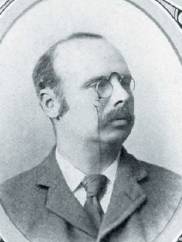
| William WHITFELD |
|
 |
William Henry Whitfeld è nato il 15 ottobre del 1856 a Whist Villa, una cittadina del Kent con un nome che sa di predestinazione ed è stato il primo grande problemista a doppio morto della storia del Whist. La ricerca della soluzione dei suoi problemi ha fatto arrovellare un gran numero di lettori a cavallo dei secoli scorsi.
Ha studiato in una scuola privata a Ramsgate e più tardi è entrato al prestigioso Trinity College di Cambridge dove si è laureato in matematica nel 1880.
Ha insegnato per alcuni anni al Cavendish College prima di provarsi in altre attività lavorative.
Il suo amore per il Whist (l'antenato del bridge) risale alla sua prima gioventù, fu uno dei primi matematici a studiare le leggi del gioco e divenne famoso per l'ideazione di alcuni Finali di Partita davvero originali e, per il suo tempo, molto complicati.
La storia di alcuni di questi potete leggerla nella versione in lingua inglese qui sotto.
![]()
![]() The foremost inventor of double-dummy problems, and a
whist mathematician and analyst of great ability. Mr. Whitfeld was born at Whist
Villa, Ashford , Kent , England , October 15, 1856. He informs us that the name
of the house had reference to its retired character, and not to the game. He
attended a private school at Ramsgate, and afterwards, in 1876, entered Trinity
College, Cambridge . He came out as twelfth wrangler, and took his degree in
honors in 1880.
The foremost inventor of double-dummy problems, and a
whist mathematician and analyst of great ability. Mr. Whitfeld was born at Whist
Villa, Ashford , Kent , England , October 15, 1856. He informs us that the name
of the house had reference to its retired character, and not to the game. He
attended a private school at Ramsgate, and afterwards, in 1876, entered Trinity
College, Cambridge . He came out as twelfth wrangler, and took his degree in
honors in 1880.
As the best English mathematicians graduate at Cambridge, to be high up in the list of wranglers indicates unusual proficiency. After teaching school for two years, he became mathematical lecturer at Cavendish College, Cambridge (named after the Duke of Devonshire, and not after Henry Jones). It is another coincidence that the college is located in the parish of Trumpington. After Cavendish College became involved in financial difficulties, in 1891, Mr. Whitfeld sought other fields of labor, and he is, among other things, engaged by the examining syndicate of bodies affiliated with the University of Cambridge.
Mr. Whitfeld has been very fond of whist from an early age. Though at no time a great frequenter of the whist-table, as compared with some devotees of the game, he has devoted much spare time to analyzing positions and working out problems. His first contributions to whist literature consisted of some double-dummy problems published in 1880 in the Cambridge Review, an undergraduates' journal. His fame as a whist problemist was established, however, by a double dummy problem which he sent to the London field, and which appeared in its issue of January 31, 1885.
This is conceded to be the most difficult problem of its kind ever constructed. It may be of interest to know that it was composed in bed. Mr. Whitfeld was kept awake one night by a strong cup of coffee, and employed his sleepless moments in thinking it out. In the morning it was finished. Before its appearance in the Field, "Cavendish" sent a copy of it to N. B. Trist, and the latter had it published in the New Orleans Times-Democrat, from which paper it was extensively copied, and went the rounds in this country. Many whist-players wrote that there must be some mistake about it, as they found it impossible of solution.
As eminent an expert as C. D. P. Hamilton stated that it took him two weeks, and he did not see how Proctor could possibly have solved it in fifteen minutes that was the story which had come over from England . Proctor's name was curiously connected with it in this country. It was generally spoken of as the "Proctor problem," and Professor Proctor was supposed to have composed it.
It required a letter from "Cavendish," in Whist, to correct the error.
R. F. Foster writes as follows concerning the problem in the New York Sun of March I, 1896: "H. H. Waldo, a bookseller in Rockford , 111, published it in the Rockford Gazette, in 1885, and offered any whist book on the market as a prize for its solution. The Racine Whist Club spent three weeks over it in vain. No one in the Milwaukee Whist Club could solve it, and the prize was finally won by Dr. B. F. Crummer, of Omaha , Neb. , who sent in his solution many weeks after the problem first appeared. Nothing indicates better than this problem the progress whist has made in the past ten years.
In 1885 a prize for its solution went begging for months; to-day we have thirty-five correct answers out of one hundred and fifty-eight attempts."
| Precedente / Previous | Successivo / Next |